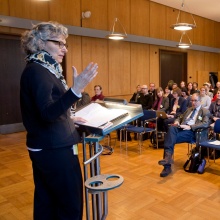This inter-university initiative, funded by The Ministry for Science, Research and Art in Baden-Wuerttemberg, was launched in autumn 2016. All types of higher education institutions, including universities, teacher training colleges, universities of applied science and also of art and music, along with the dual universities in the state of Baden Württemberg are involved in the project.
According to Theresia Bauer, Minister for Science, “Digitalization opens up a wealth of new opportunities for universities and higher educational institutions. E-learning is creating an exciting new approach to learning and can, for example, make it much easier for people who work to study part time as well.” And that is why the state of Baden Württemberg is helping its universities to achieve their full digital potential and make the most of the opportunities that this brings.
48 universities are involved in the network
With this collaborative approach, 48 universities in total are pushing to establish a synergetic and thus more efficient approach to digitally supported teaching. As the manager of HND BW, Dr. Alexander Classen points out, “Digitalized courses complement classical forms of academic teaching. This approach is a response to an increasingly diverse student population and enables more flexibility due to the fact that it is not tied to a particular location and also makes learning materials readily accessible. Furthermore, increasing digitalization also demonstrates that the universities are aware of their responsibility to teach students the necessary media skills, as these are extremely important for their future careers.”
HND BW organizes new projects and cooperative alliances by encouraging collaboration between specialist groups of experts and university committees.
First network meeting at the University of Stuttgart
The members of the university committees met on January 19, 2017 to establish the inter-university specialist groups.
In its first year, HND BW will start developing a communal repository for Open Educational Resources and expanding the relevant E-learning advice and qualification information for lecturers. Classen continues, “It is only if we succeed in truly integrating digital teaching and learning information as an option in existing university courses that digitalized teaching can be used to its full potential”.
The goal is to ensure that both lecturers and students at all of the universities involved in the network are able to develop a secure and competent understanding of digital teaching and learning information.
During the first network meeting, which took place at the University of Stuttgart, a number of other areas that would require further cooperation became apparent. Aside from the OER repository and the subject of qualification, the network members also discussed the topics of E-learning strategies, IT infrastructure and the topic of inter-university online courses/MOOCs.
The network’s website will go live on February 1, 2017 at the address www.hnd-bw.de.


